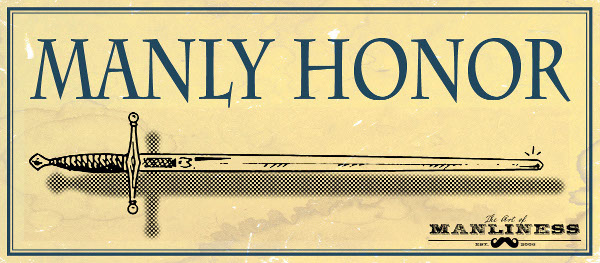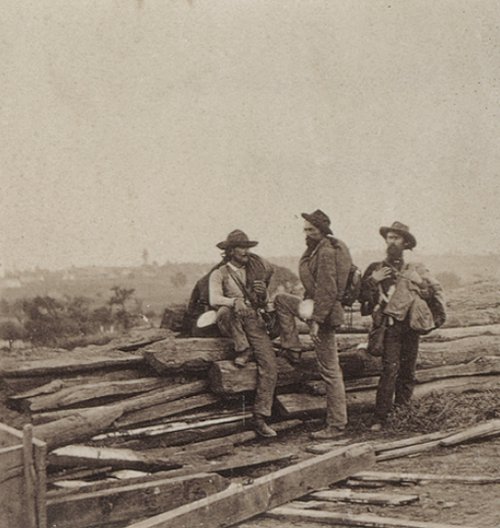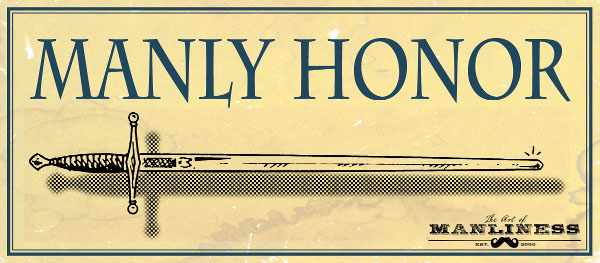
This article series is now available as a professionally formatted, distraction free ebook to read offline at your leisure. Click here to buy.
Across cultures and time, honor and manliness have been inextricably tied together. In many cases, they were synonymous. Honor lost was manhood lost. Because honor was such a central aspect of a man’s masculine identity, men would go to great lengths to win honor and prevent its loss.
If we take even a cursory look at history, honor pops up over and over again as a central theme in literature and life. The epic poems of Homer are primarily about honor and man’s quest to achieve and maintain it. If you read Shakespeare’s plays with a close eye, you’ll find that honor and manhood take center stage as reoccurring themes. During the 17th and all the way into the early 20th century, upperclass men in Europe and the United States regularly engaged in duels on “fields of honor” to defend their manhood. When signing the Declaration of Independence, the American Founding Fathers “mutually pledged to each other our lives, our fortunes, and our sacred honor.”
But what exactly is honor?
We throw the word around quite a bit in our modern lexicon and give it a lot of lip service, but if you were to ask someone, “What is honor?” you’ll likely be answered with furrowed brows and head scratches. We think we know what it is, but often find it difficult to articulate when pressed. If you’re lucky enough to get an answer out of someone, they’ll likely say that honor means being true to a set of personal ideals, or being a man of integrity.
Honor=integrity is the point to which the definition of honor has evolved and what it generally means in our society today. In fact, it’s how we defined honor in our book, The Art of Manliness Manvotionals.
That definition of honor, while correct in our modern use of the word, doesn’t really capture the concept of honor that Homer wrote about, that countless duelists died for, and that our Founding Fathers swore upon. Except for a few pockets of society like the military, fire departments, and criminal gangs, honor, as millions of men from the past understood it, barely exists in the modern West. When folks in the mainstream do bring up this type of honor, it’s usually done in jest. (See Man Code or Bro Code).
And while there are certainly some very troubling aspects of honor as it was understood in the past (which we’ll explore), I believe that part of the decline of manhood in America and other Western countries can be traced in part to a lack of a positive notion and healthy appreciation of the kind of classic honor that compelled (and checked) our manly ancestors.
Over the next few weeks, we’re going to explore honor — what it is, its history and decline in the West, and its moral quandaries. We’ll also investigate how we can revive manly honor in a culture that fears, mocks, and suppresses it.
Today, we’ll begin by exploring what honor is. This post will lay the foundation of our discussion over the next few weeks. I’ll be honest with you: once you move beyond surface definitions, honor is not an easy topic to understand and requires you to really get your cognitive gears in motion. Surprisingly little has been written on such an important subject, and the anthropologists, sociologists, and historians who have tackled it have tended to describe various parts and expressions of it, without ever seeming to find its core. For example one of the few books on the subject, Honor: A History by James Bowman, is filled with a ton of fascinating insights into the history of honor, but at the end, one is left with the impression that Bowman himself wasn’t entirely sure what it meant. It is simply extremely difficult to recapture and describe something that was once so intrinsic to people’s lives that they did not feel the need to explain it. I cannot hope to do better than the academics who have come before, but I have tried to synthesize and distill out the most salient and important points to understand about the classic idea of honor and what it means for manliness.
Watch the Video
Horizontal vs. Vertical Honor
Anthropologist Frank Henderson Stewart makes the case that honor comes in two types: horizontal and vertical.
Horizontal Honor
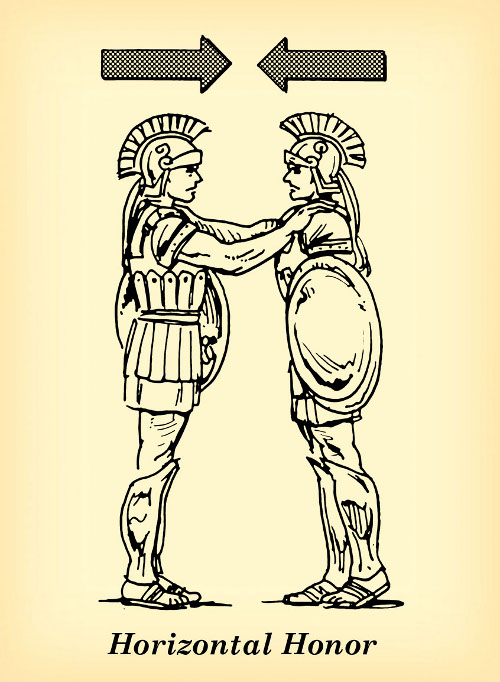
Horizontal honor is defined as the “right to respect among an exclusive society of equals.”
Horizontal honor = mutual respect. But don’t let the term “mutual respect” fool you. We’re not talking about the sort of watered-down “respect-me-simply-because-I’m-a-human-being” kind of respect that pervades our modern culture. For horizontal honor to mean anything, it must be contingent upon certain unyielding standards in order to maintain honor within the group.
The existence of horizontal honor is premised on three elements:
A code of honor. A code of honor lays out the standards that must be reached in order for a person to receive respect within a group. These rules outline what it takes to obtain honor (or respect), and how it may be lost. That last stipulation is paramount: honor that cannot be lost is not honor.
Codes of honor often lay out very high standards for the group, but despite their difficulty, codes of honor are always viewed as minimum standards for inclusion. If you can’t meet them, then you’re seen as deficient, even despicable, and are thus shamed.
An honor group. An honor group consists of individuals who understand and have committed to live the code of honor. That everyone in the group has done this is understood by all other members of the group. Because honor depends on respect, an honor group must be a society of equals. Honor is based on the judgments of other members in the group, therefore the opinion of those members must matter to you, and they won’t if you don’t see them as your equals. Respect is a two-way street. While you might respect someone above you in the social pecking order, it’s hard to respect someone you think is beneath you.
Honor groups must also be exclusive. If everyone and anyone can be part of the group, regardless of whether they live by the code or not, then honor becomes meaningless. Egalitarianism and honor cannot coexist.
Finally, the honor group needs to be tight-knit and intimate. A society governed by mutual respect requires everyone in the society to know each other and interact face-to-face. Honor cannot exist in a society where anonymity dominates.
Shame. A person who fails to live up to the group’s code loses his honor — his right to the respect of the other honor group members as equals. A healthy feeling of shame, or the recognition that a person has failed to live up to the honor group’s code is necessary for honor to exist. When individuals stop caring whether they’ve lost their right to respect in the group (i.e. living without shame), honor loses its power to compel and check individuals’ behavior.
Horizontal honor is an all-or-nothing game. You either have the respect of your peers or you don’t. Bringing dishonor upon yourself by failing to meet the minimum standards of the group (or showing disdain or indifference for those standards) means exclusion from the group, as well as shame. Thus, in a tribe/team/group/gang, horizontal honor serves as a dividing line between us and them, between the honorable and the despicable.
I like to think of horizontal honor as your membership card into a club. To get the card, you need to meet a baseline of criteria. When you present the card at the clubhouse door, you have access to all the rights and privileges that come with being a member of that club. To maintain your status and inclusion in the club, you must conform to the club rules. Failure to conform results in your membership card being taken away and exclusion from the club.
This card analogy still resonates today in the few corrupted threads of honor that remain in our culture. Men will talk about taking away each other’s “man cards” — but the violations that invoke this mocking “punishment” are for frivolous things like drinking a fruity cocktail at a bar, and bear only the faintest echoes of the original code of men.
Vertical Honor
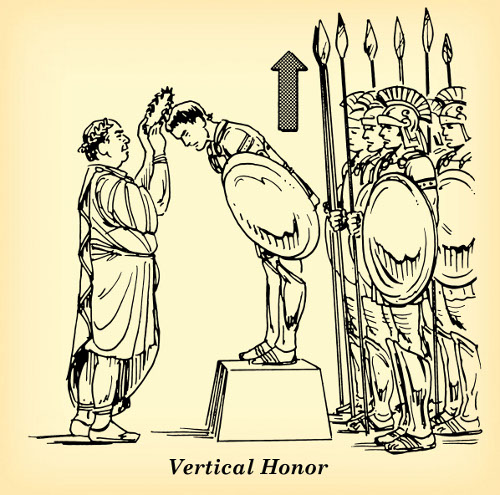
Vertical honor, on the other hand, isn’t about mutual respect, but is rather about giving praise and esteem to those “who are superior, whether by virtue of their abilities, their rank, their services to the community, their sex, their kinship, their office, or anything else.” (Stewart p. 59). Vertical honor, by its nature, is hierarchical and competitive. Vertical honor goes to the man who not only lives the code of honor, but excels at doing so.
So, vertical honor = praise, esteem, admiration.
In What Is Honor? Alexander Welsh makes the case that for vertical honor to exist, horizontal honor must first be present. Without a baseline of mutual respect among equal peers (horizontal honor), winning praise and esteem (vertical honor) means very little.
To illustrate this point, imagine you write a novel. Your mom and dad say it’s the best thing they’ve ever read. Two published novelists also read it and say it’s the best thing they’ve ever read. Whose praise means more to you?
The praise from the other novelists, of course.
Sure, kudos from your parents is nice, but their opinion doesn’t mean too much to you because you don’t respect them as fellow writers. Getting praise from your fellow writers? That means a lot.
To add on to my club analogy, vertical honor is like the awards and trophies that clubs bestow on members. To even be considered for the award, you need to be a member of the club; you need the membership card (horizontal honor). But being a card carrying member isn’t enough. To win a trophy, you must distinguish yourself from your peers by outperforming them and achieving excellence according to the club’s code.
Honor = Reputation
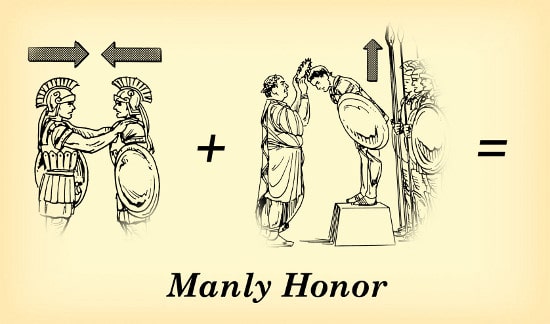
So “honor” as our forebears understood it consisted of two parts: respect from the honor group (horizontal honor) and praise from the honor group (vertical honor). Implicit in this bipartite notion of honor is that it depends on the opinion of others. You can have a sense of your own honor, but that isn’t enough — others must recognize your honor for it to exist. Or as anthropologist Julian Pitt-Rivers put it:
“Honour is the value of a person in his own eyes, but also in the eyes of his society. It is his estimation of his own worth, his claim to pride, but it is also the acknowledgment of that claim, his excellence recognized by society, his right to pride.”
Thus, honor is a reputation worthy of respect and admiration.
Manhood and Honor
So we’ve uncovered that honor is a reputation worthy of respect and admiration, and you earn that reputation by allegiance to an honor code. The next questions that naturally arise are: What code of honor must a man abide by to have respect from men, to be thought of as a man, and be included in the group of men (horizontal honor)? And what must he do to win praise and esteem from his fellow men (vertical honor)?
While honor is universal to both men and women, its standards have historically been gendered. While codes of honor have varied across time and cultures, in its most primitive form, honor has meant chastity for women and courage for men. To courage and honor itself, Jack Donovan, author of The Way of Men, convincingly adds strength and mastery to the traits that constitute the most basic code of men.
How did this connection between manhood, bravery, and honor evolve?
During times when the rule of law was weak, and professional military and law enforcement bodies did not exist, honor acted as the moral force that governed the tribe and maintained its survival. Men were expected to act as the tribe’s protectors, a role in which strength and courage were vitally necessary. If they were not strong physically, they were expected to contribute in another way through mastery of a skill (shaman, medicine man, scout, weapons and craft-maker, etc.) that benefited the tribe. Honor is what motivated men to fulfill these expectations. If they showed courage and mastery, they were honored as men (horizontal honor), and with that honor came the privileges of being a full member of the tribe. If they excelled at the honor code, they were granted even more status, and thus more privileges (vertical honor). But, if they showed cowardice and laziness, then they were shamed as unmanly, and lost their access to those privileges.
Defending One’s Honor
This is why defending one’s honor, or reputation, was (in many cases) a matter of success and ruin, life and death, for our manly ancestors. Even as late as 19th century America, maintaining your honor was essential to getting a good job as a lawyer or politician, and moving into good society. Thus in order to continue to enjoy the privileges due the honorable, men were highly motivated and incredibly vigilant about staying on the honor side of the shame/honor line. It was for this reason that in many honor cultures (although not all) any injury or insult to one’s reputation required immediate remedy. If you got hit, you hit back. Saving face was paramount, and retaliation was done to prove you were “game” — you still had the courage that made you worthy of honor and would not be trifled with (think of dueling).
This retaliatory honor, called reflexive honor by anthropologists, was both inspiring and troubling for Western society going all the way back to the ancient Greeks. If taken to extremes, reflexive honor becomes an “irrational pissing contest” that can destroy the community. For this reason, as societies become more civilized, they try to temper man’s base instinct to retaliate when their honor has been impugned by giving reflexive honor a moral and ethical framework, and adding virtues like mercy and magnanimity to the code of honor which had to be kept. This tempering of reflexive honor is what gave us knightly chivalry and Victorian gentlemanliness with its notions of “fair play.”
A Man’s Honor, The Group’s Honor
Concern for one’s honor was both a selfish and selfless pursuit. On the one hand, men wanted to be thought of as men and respected members of the tribe, and desired the privileges that went with that (horizontal honor). Membership in the group also entitled them to the opportunity to gain vertical honor and further status and privilege through their worthy deeds. Their reputation for strength and courage also kept other men within the tribe from messing with them.
At the same time, a man’s honorable reputation benefited the tribe as a whole. Each individual man’s reputation for courage in the group added to the group’s reputation for courage and strength. The more formidable a group’s reputation, the less likely it would have been for other groups to try to mess with it. This is why men who do not care about their honor are shamed by the group — their disloyalty puts the whole group at greater risk. Or as Bowman puts it, “The worst of the sins against honor–culminating in actual cowardice and flight–always elevated the individual above the group.”
Donovan explains this intra/inter group dynamic of honor well:
“Men who want to avoid being rejected by the gang will work hard and compete with each other to gain the respect of the male gang. Men who are stronger, more courageous and more competent by nature will compete with each other for higher status within that group. As long as there is something to be gained by achieving a higher position within the gang—whether it is greater control, greater access to resources or just peer esteem and the comfort of being higher in the hierarchy than the guys at the bottom—men will compete against each other for a higher position. However, because humans are cooperative hunters, the party-gang principle scales down to the individual level. Just as groups of men will compete against each other but unite if they believe more can be gained through cooperation, individual men will compete within a gang when there is no major external threat but then put aside their differences for the good of the group. Men aren’t wired to fight or cooperate; they are wired to fight and cooperate.
Understanding this ability to perceive and prioritize different levels of conflict is essential to understanding The Way of Men and the four tactical virtues. Men will constantly shift gears from in-group competition to competition between groups, or competition against an external threat.
It is good to be stronger than other men within your gang, but it is also important for your gang to be stronger than another gang. Men will challenge their comrades and test each other’s courage, but in many ways this intragroup challenging prepares men to face intergroup competition. Just as it is important for men to show their peers they won’t be pushed around, the survival of a group can depend on whether or not they are willing push back against other groups to protect their own interests. Men love to show off new skills and find ways to best their pals, but mastery of many of the same skills will be crucial in battles with nature and other men. The sports and games men play most demand the kind of strategic thinking and/or physical virtuosity that would be required in a survival struggle. A man’s reputation may keep men in his group from messing with him, and a group’s reputation may make its enemies think twice about creating animosity.”
Conclusion
Hopefully, unless your brain tuckered out halfway through, you’ve now gained a working framework for understanding what honor is, and how it used to operate in the West (and still does in places like the Middle East).
Two weeks from now, we’ll explore the reasons for the decline of honor in the West. Then in my final post about honor, I’ll propose a solution to the modern male honor gap by providing a framework for a positive notion of manly honor that avoids the senseless violence of primitive codes of honor and the farce and inanity of modern Man and Bro Codes, and lays out a framework for a code of honor that motivates men to become the best they can be.
Manly Honor Series:
Part I: What is Honor?
Part II: The Decline of Traditional Honor in the West, Ancient Greece to the Romantic Period
Part III: The Victorian Era and the Development of the Stoic-Christian Code of Honor
Part IV: The Gentlemen and the Roughs: The Collision of Two Honor Codes in the American North
Part V: Honor in the American South
Part VI: The Decline of Traditional Honor in the West in the 20th Century
Part VII: How and Why to Revive Manly Honor in the Twenty-First Century
Podcast: The Gentlemen and the Roughs with Dr. Lorien Foote
_________________
Sources:
Honor by Frank Henderson Stewart
What Is Honor: A Question of Moral Imperatives by Alexander Welsh
Honor: A History by James Bowman
The Way of Men by Jack Donovan
Illustrations by Ted Slampyak


